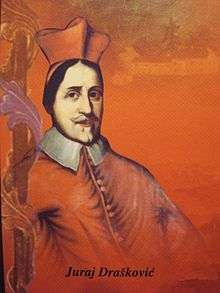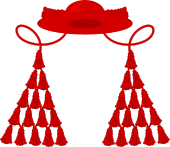Juraj Drašković
| His Eminence Juraj Drašković | |
|---|---|
| Cardinal, Archbishop of Kalocsa | |
 | |
| Diocese | Kalocsa |
| Predecessor | Matija Bruman |
| Successor | Ivan Kranjčić Moslavački |
| Orders | |
| Ordination | 1553 |
| Consecration | 22 April 1557 |
| Created Cardinal | 18 December 1585 |
| Rank | Cardinal archbishop |
| Personal details | |
| Born |
5 February 1525 Bilina near Knin, southern Croatia |
| Died |
31 January 1587 (aged 61) Vienna, Habsburg Monarchy |
| Buried |
Cathedral of Blessed Virgin Mary in Győr, Hungary |
| Nationality | Croat |
| Denomination | Roman Catholic |
| Residence | Zagreb |
| Parents | Bartol and Ana née Utješinović |
| Occupation | Catholic priest |
Juraj II Drašković (English: George II Drashkovich, Croatian: Juraj II. Drašković, Hungarian: Draskovics II. György), 5 February 1525 – 31 January 1587) was a Croatian nobleman, statesman and Catholic bishop and cardinal, very powerful and influential in the Croato-Hungarian Kingdom. He was a member of the Drašković noble family and elected by Sabor – the Parliament of Croatia – as Ban (viceroy) of Croatia to rule the country between 1567 and 1578.
Biography
Juraj Drašković was born at Bilina near Knin (southern Croatia), the eldest son of Bartol /Bartholomew/ Drašković (*c.1500; †1538) and his wife Ana née Utješinović, a sister of cardinal Juraj Utješinović /George Utissenich alias George Martinuzzi/ (*1482; †1551), bishop of Oradea and archbishop of Esztergom. Having lived in turbulent and dangerous times of Ottoman invasion, Bartol's family moved from southern Croatia to Karlovac region in the west part of the country. During Juraj's childhood, his father died and he was raised by his mother and his influential uncle Utješinović. He was schooled for priesthood in Krakow (Poland) and Vienna (Austria). In 1550 he went to study law in Padova (Italy).
Drašković started his career as provost in Arad (Romania) and after that in Jasov (today in Slovakia). In 1553 he was appointed secretary of the Holy Roman Emperor and Croato-Hungarian king Ferdinand I of Habsburg and in 1555 he took over the prepositure of Požun (present day Bratislava, Slovakia). On 22 April 1557, Drašković became bishop of Pécs in southern Hungary and in 1563 he took over the bishop's chair in Zagreb, the capital of the Kingdom of Croatia within the Habsburg Monarchy, where he stayed until 1578.
In the meantime he was in 1567 chosen to be Ban of Croatia, together with knez (duke) Franjo Frankopan Slunjski, a member of Frankopan noble family. After Frankopan's death on 2 December 1572, Drašković reigned alone until 1574 and together with co-Ban Gašpar Alapić, former deputy viceroy, after that. During his reign, political and social situation in Croatia was extremely complicated, marked by Ottoman invasion, noblemen conflicts, Protestantism breakthrough and peasant revolts. However, he was known as wise theologian and politician, who was always in the right place at the right time, settling most of troubles.
In 1574 Drašković was appointed archbishop of Kalocsa (Hungary), retaining the rule of Diocese of Zagreb. In 1578 he moved to Diocese of Györ and became at the same time the royal chancellor. Emperor and king Rudolf II of Habsburg promoted him and made him the royal governor of Hungary (1584), which is a title equal to Hungarian palatine.
Drašković became cardinal at the first consistory of Pope Sixtus V on 18 December 1585. On his way to Rome he suddenly died in Vienna on 31 January 1587, at the age of 61. He was buried in the Cathedral of Blessed Virgin Mary in Győr.
See also
References
- Ivan Hojsak: "Rodoslovlje obitelji Drašković" ("Genealogy of the Drašković family"), Varaždin 2004, ISBN 953-6775-76-X
External links
- Viceroy and cardinal Juraj Drašković in the „History of Croatia“ by PhD Rudolf Horvat, Croatian historian
- Juraj Drašković in „The Ottoman threat, noble displacees and Croatian identity“ by Ivan Jurković from the Faculty of philosophy in Pula
- Short biography
- Portrait of Juraj Drašković
| Catholic Church titles | ||
|---|---|---|
| Preceded by Matija Bruman |
Bishop of Zagreb 1563–1578 |
Succeeded by Ivan Kranjčić Moslavački |
